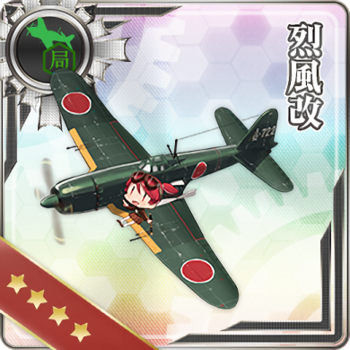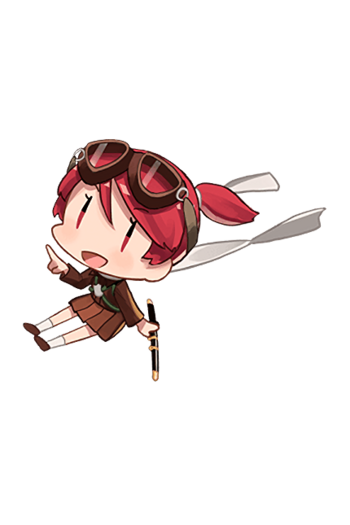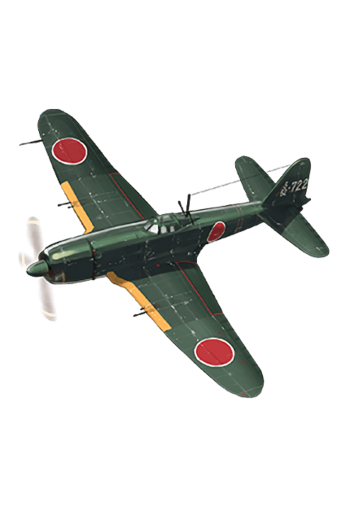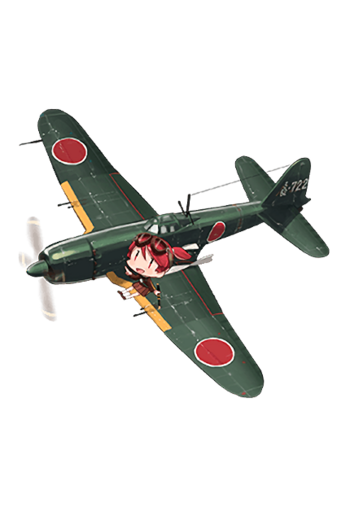Reppuu Kai
[Edit]
Strong Gale Mk.1
No.333 烈風改
| |
| Refittable Ship Types | |
| Fast Battleship | Battleship |
| Aviation Battleship | Standard Aircraft Carrier |
| Armored Carrier | Light Carrier |
| Heavy Cruiser | Aviation Cruiser |
| Light Cruiser | Torpedo Cruiser |
| Training Cruiser | Destroyer |
| Coastal Defense Ship | Submarine |
| Aircraft Carrying Submarine | Seaplane Tender |
| Fleet Oiler | Submarine Tender |
| Repair Ship | Amphibious Assault Ship |
| LBAS Plane | |
Introduction
名機「零戦」の後継機として開発された、最新鋭艦上戦闘機「烈風」。
同機をベースに高高度で重爆を邀撃するために排気タービン過給器、そして30mm機銃を斜め銃含めて計6挺を装備した、圧倒的火力を持つ重武装局地戦闘機として開発が進められていたのが、本機「烈風改」です。
幻の翼を、提督の航空隊に!
The "Reppuu" was a state-of-the-art carrier-borne fighter developed as the successor to the high-performance "Zero".
Using that as a base, the "Reppuu Kai" is a heavily armed interceptor designed to shoot down high-altitude heavy bombers. It was equipped with a supercharged turbine engine with six 30 mm machine guns, some of which were obliquely mounted.
Use these wings from a dream in your Air Force!
Mechanics
Land-Based Fighters/Interceptors are LBAS exclusive fighters, that are used to either:
- Provide Sortie Fighter-Power, where the "fighter Power" , "interception" , and "combat radius" stats are the most important,
- Intercept enemy bombers, where the "fighter Power" , "interception" , and especially the "anti-bomber" stats are the most important.
Notes
Not to be confused with "Reppuu Model 11 " (烈風 一一型), which was previously named Reppuu Kai (烈風改) (2019-03-08).
Not to be confused with other aircraft of this family (see here).
How To Obtain
Event reward for:
- Spring 2019 Event E-1: Hard, Medium, Easy
Updates History
- 2019-05-21: Implemented
Trivia
The Mitsubishi A7M Reppū ("Strong Gale", Allied reporting name "Sam") was a naval fighter developed as a successor to the infamous A6M Zero.
The result of the 17-shi carrier-based fighter specification, the Zero's successor (then referred to as Navy Experimental Type 17 Type-A) was expected to be able to climb to 6 000 m in less than 6 min and then fly above that altitude at 639 km/h, all while carrying two 20 mm cannons and two 13 mm machine guns and retaining the A6M3's impressive maneuverability.
The Reppū's development was delayed due to development issues related to the engine and airframe, as well as production prioritizing other aircraft.
The A7M1 Reppū prototype finally flew in May 1944, demonstrating excellent handling and maneuverability but could not attain its lofty 640 km/h target due to the underpowered NK9 engine. The Navy ordered development stopped due to the failure, but Mitsubishi obtained permission to test the aircraft with the MK9 engine.
The A7M2 prototype flew in October 1944, achieving a top speed of 628 km/h while surpassing the Zero in many metrics, leading the Navy to officially adopt the type. Saburo Sakai declared it was the finest fighter he had ever seen, while engineers claimed it could fight at altitudes up to 12 km.
The Reppū was expected to replace the Zero as the standard fighter of the IJN, but production was disrupted due to earthquakes, Allied bombings, and the loss of schematics and manufacturing jigs. The Reppū subsequently never flew in combat.
The A7M3-J "Reppū Kai" was a proposed interceptor variant of the Reppū, with an increased maximum speed of 648 km/h using a 2 200 hp forced-induction version of the Mitsubishi MK9 and an armament consisting of six 30 mm cannons. No working prototype was ever produced, the design documents being lost in the bombings of March 1944.
The depicted plane is allegedly the A7M3-J variant (did not exist/enter service as is).



